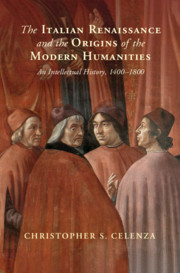Book contents
- The Italian Renaissance and the Origins of the Modern Humanities
- The Italian Renaissance and the Origins of the Modern Humanities
- Copyright page
- Dedication
- Contents
- Figures
- Preface and Acknowledgments
- 1 Philology, the Italian Renaissance, and Authorship
- 2 Lorenzo Valla, Philology, Emotion
- 3 Losing Your Identity: Angelo Decembrio
- 4 Trust and Authenticity
- 5 Pursuing a Love of Knowledge
- 6 Shaping Knowledge
- 7 Forgetting Philology: René Descartes
- 8 Certainty. Skepticism
- 9 Echoes
- Bibliography
- Index
7 - Forgetting Philology: René Descartes
Published online by Cambridge University Press: 09 November 2021
- The Italian Renaissance and the Origins of the Modern Humanities
- The Italian Renaissance and the Origins of the Modern Humanities
- Copyright page
- Dedication
- Contents
- Figures
- Preface and Acknowledgments
- 1 Philology, the Italian Renaissance, and Authorship
- 2 Lorenzo Valla, Philology, Emotion
- 3 Losing Your Identity: Angelo Decembrio
- 4 Trust and Authenticity
- 5 Pursuing a Love of Knowledge
- 6 Shaping Knowledge
- 7 Forgetting Philology: René Descartes
- 8 Certainty. Skepticism
- 9 Echoes
- Bibliography
- Index
Summary
This chapter focuses on the philosopher René Descartes. While Descartes is often seen as the initiator of modern habits of thinking – especially of the idea that the mind and body are distinct – here we view him as an outgrowth of Italian humanism. Descartes was educated by the Jesuits, at the time a new but influential religious order. From them, he imbibed Italian humanism’s respect for antiquity, its deep commitment to classical Latin, and most importantly its sometimes unarticulated through-line: that, to look at the world clearly, one needs to imagine oneself outside of it. But the Jesuits added something to Italian humanism: a deep respect for medieval Catholic theology, something that Descartes also took on board. His humanist education left him dissatisfied, however, laden with a feeling that it was not enough to establish a sure foundation on which could build a new way of looking at the natural world. Accordingly, he jettisoned the world of books, texts, and philology, grounding his perceptions of truth in the only thing about which he could be absolutely certain: that he existed. It is with Descartes that we can locate the beginnings of the modern separation of disciplines, as “natural philosophy” evolved into our modern natural sciences and separated itself from “philosophy” broadly conceived.
Keywords
- Type
- Chapter
- Information
- The Italian Renaissance and the Origins of the Modern HumanitiesAn Intellectual History, 1400–1800, pp. 158 - 200Publisher: Cambridge University PressPrint publication year: 2021

